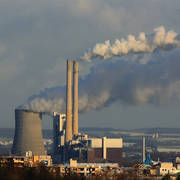Ocean Acidification
What is ocean acidification?
The ocean absorbs approximately 26% of the CO2 added to the atmosphere from human activities each year, greatly reducing the impact of this greenhouse gas on the climate. When CO2 dissolves in seawater, carbonic acid is formed. It is this chemical reaction that leads to ocean acidification. Ocean acidity has increased by 30% since the beginning of the Industrial Revolution.
How is this threatening our Ocean?
Ocean acidity increases the amount of energy needed by many small ocean organisms in constructing their carbonate shells and structures, and in some places will make it impossible for these organisms to live. It causes seawater to become corrosive to the shells and skeletons of numerous marine organisms, affecting their reproduction and physiology. This will have impacts on ocean ecosystems that science is still examining.
Within decades, the chemistry of the tropical oceans will not sustain coral reef growth while large parts of the polar oceans will become corrosive to calcareous marine organisms.
How does this affect me?
Coral reefs are the nurseries of the oceans, they are biodiversity hot spots. On some tropical coral reefs, for example, there can be 1,000 species per m². Their decline affects tourism, food security, shoreline protection and biodiversity.
Ocean acidification may have a strong negative impact on many plankton and zooplankton species that form the base of the marine food chain. Plankton is key to the survival of larger
fish, and their decline may trigger a chain reaction through the marine food web. This will affect the multi-billion dollar commercial fisheries and shellfish industries, as well as threatening the food security for millions of the world’s poorest people.
Ocean acidification, along with warming surface waters, may reduce the ability of the ocean to absorb CO2, leaving more CO2 in the atmosphere and worsening its impact on the climate.
A culture of peace is a culture of sustainable development
The ocean is a vital source of nourishment, especially to people in the world’s poorest nations. Many depend on fish for their primary source of protein; fisheries and aquaculture support the livelihoods of about 540 million people (8% of the world’s population). Given the likelihood that ocean acidification will negatively affect biodiversity and commercial fisheries, global policies are essential to insure against extreme food shortages that could lead to famine, increased poverty and conflicts, including war.
Learning to manage our ocean sustainably is the only path to global prosperity and peace.
What can I do?
- Find out as much as you can about this problem and educate your friends.
- Respect protected areas and the coast. There is some evidence that some coastal pollution is exacerbating the acidification problem.
- Reduce your CO2 emissions by:
- Saving energy: turn off the lights when leaving an empty room, use energy efficient light bulbs and appliances.
- Saving water. Turn off the tap when brushing your teeth or shaving, take short showers instead of baths, and check for wasteful leaks.
- Greening your transportation: carpool, use public transportation or bike.
- Greening your home: optimize insulation, heating and cooling systems.
What is UNESCO-IOC doing?
Ocean acidification is a relatively new field of study. Despite advances in understanding the impacts of elevated CO2 concentrations on a wide range of marine organisms, we are still unable to make meaningful projections of impacts on marine ecosystems and fisheries as a whole, or to identify thresholds beyond which marine ecosystems may not recover. Methods must be developed to examine the full ecosystem response to multiple environmental factors.
UNESCO is proud to be a partner of the Tara Oceans expedition, a 3 year mission around the world aiming to understand how the nature and diversity of planktonic life will be affected by climate change and acidification. The impacts of plankton on life on earth are so broad that they are highly important for global human security; it is absolutely essential to get a better understanding of plankton ecosystems. The expedition is also collecting data on poorly explored coral reef ecosystems. Check out their progress on the log book.
UNESCO-IOC and the Scientific Committee on Oceanic Research (SCOR) sponsor the International Ocean Carbon Coordination Project (IOCCP), a monitoring and research programme. IOCCP focuses on the effect of increasing level CO2 emissions on ocean and studies the effect of ocean acidification on calcifying organisms and coral growth rates.
UNESCO-IOC is co-founder of the Ocean Acidification network, meant to provide a central source of information for ocean scientists on research activities in this area, and co-hosts the main international symposium on this issue, ‘The Ocean in a high CO2 World’. Its purpose is to provide an interdisciplinary forum to assess what is known about ocean acidification and priorities for future research every 4 years.
The primary way to protect the ocean from the threat of ocean acidification is to reduce CO2 emissions. Business as usual scenarios for CO2 emissions could make the ocean up to 150% more acidic by 2100. This is about common resources that flow though political boundaries: our atmosphere and our ocean. An issue of this magnitude requires a global effort. UNESCO’s Intergovernmental Oceanographic Commission (UNESCO-IOC) is keen to play an advocating role for the ocean through the Rio+20 preparatory process, and to encourage Member States to integrate, as far as possible, the importance of the ocean in sustainable development strategies and plans.




